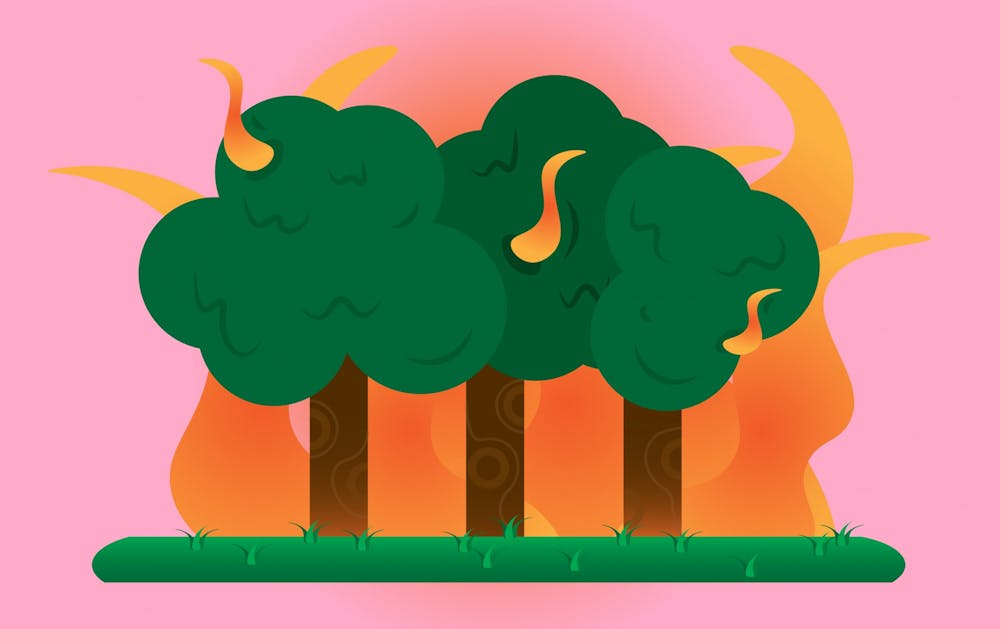Even discounting indisputably human catastrophes, 2020 has been relentless. This year has given us wildfires from California to Australia, a global pandemic and the earliest third-named tropical storm on record. Arizona hasn't been spared either, with a brush fire forcing evacuations and keeping part of a state highway closed.
The toll of these disasters is immense. The new coronavirus has infected over 10 million people, killing over 500,000 worldwide. Tropical Storm Cristobal caused immense damage to Mexico and the U.S. The Arizona brush fires have burned over 150,000 acres. But, while disease, storms and fire are all considered natural phenomena, it takes human mismanagement to create a disaster.
Take Arizona's response to the COVID-19 pandemic, for example. In January, Arizona was one of the first states to have a COVID-19 case. While the state government declared a public health emergency on March 12, Gov. Doug Ducey didn't limit public gatherings, as other states had done, until March 19. A stay-at-home order wasn't issued until the end of March, at which point victims had begun dying.
And now, after a hasty reopening, Arizona has a record number of hospitalizations and cases of the virus. While the disease is natural, the disastrous situation is completely unnatural.
To prove it, I'll compare our predicament to how things went down in Wuhan, the Chinese city where COVID-19 was first discovered.
On January 23, the central government of China put Wuhan under quarantine. Masks were made mandatory in public, and public health officials still are taking the temperature of travelers leaving the city. Fully functional hospitals were rapidly constructed to accommodate the surge of cases. By April, the lockdown was eased, with citywide testing conducted as late as May.
Wuhan reported 0 new cases by June. Keeping masks on as a precaution, life in the city has slowly returned to normal.
China wasn't alone in addressing the hazard of COVID-19 head-on. Vietnam was accused of overreaction in its aggressive response to the virus, but through early efforts was able to keep infections low, without a single death reported.
Cuba sent doctors to Italy when the European country was at the height of its infection rate — an offer that the U.S. refused 15 years ago when New Orleans was recovering from the unnatural disaster caused by the aftermath of Hurricane Katrina due to the U.S.'s ongoing economic blockade of Cuba.
Madison West graduated from ASU in 2019 with an M.S. in Justice Studies and an M.A. in Sustainability. She says that the "natural" in the term "natural disasters" takes responsibility away from human actions.
If disasters were unavoidable acts of God, then Wuhan should be far more greatly afflicted by COVID-19 than Arizona. Governments of action in China, Vietnam and Cuba fought for the people, declared war on the virus and emerged victorious.
Arizona's impatient and short-sighted rulers reflected the American government's way of confronting crisis: unable to sacrifice immediate economic interests, no matter the cost.
"When we're looking at 'natural disasters' like climate change, the brush fires or the coronavirus, they're natural in the sense that they might have happened, but they wouldn't have been this bad." West said. "The 'natural' part of it takes away responsibility from human actions, specifically around capitalism."
West says that capitalist authorities are already forced to acknowledge some degree of personal responsibility for disasters, but that this responsibility is highly individualized when the causes are systemic.
"If you have a forest, and you dry it out, and companies dump flammable fluid all over it, and some kid accidentally drops a lit cigarette and lights the whole forest on fire, then is it really that kids fault?" West said. "Companies create these situations to begin with."
Stemming from the White House, there have been calls in the United States to blame China for the COVID-19 pandemic, despite its efforts to fight the virus and its international solidarity with countries affected by the disease. West says that this push of blame is an enlarged version of the move to assign individual responsibility for systemic, human causes.
"We can't prove where (the new coronavirus) came from, but we're just going to blame China because 'China is evil'," West said. "Better approaches to justice look at what harm was caused, how can we address the harm caused and how can we make sure that it doesn't happen again."
West also said that we should rethink negative assumptions of China's sustainability.
"China is kind of a boogeyman in sustainability circles," West said, "but they're the only country that hit their Paris Climate Accord commitment."
West said that to prevent future natural hazards from developing into disasters, the principles of sustainability should be adopted.
"You can't take more than you need, you can't take more without being able to replenish natural resources. That's the whole idea behind a balanced, planned economy," West said.
Instead of resigning to the perceived inevitability of disaster, we should fight for a system that can confront crises and serve the people first.
China's COVID-19 response has been called the country's Sputnik moment, harkening to the sublime accomplishment in space travel by the Soviet Union that left the capitalist West in the dust.
This achievement is further proof that a rationally planned economy and a strong, centralized state can handle crises and confront disaster.
Reach the columnist at smisceni@asu.edu or follow @IMiscenich on Twitter.
Editor’s note: The opinions presented in this column are the author’s and do not imply any endorsement from The State Press or its editors.
Want to join the conversation? Send an email to opiniondesk.statepress@gmail.com. Keep letters under 500 words and be sure to include your university affiliation. Anonymity will not be granted.
Like The State Press on Facebook and follow @statepress on Twitter.
Continue supporting student journalism and
donate to The State Press today.




